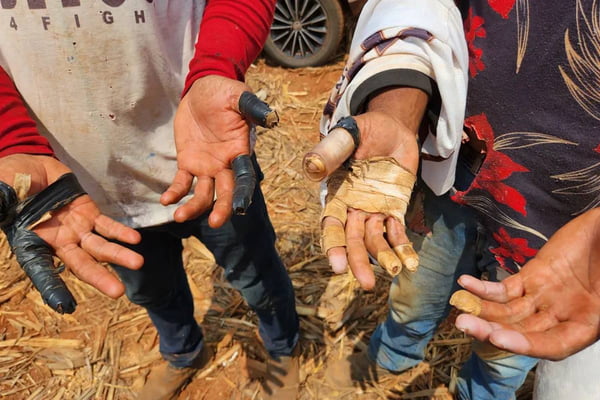Illegal prisons
First Chapter | Ongoing violation :: two years since the crisis in Pedrinhas

The Brazilian State and the government of Maranhão have failed to comply with the precautionary measure issued by the Inter-American Commission on Human Rights of the OAS that requires an immediate reduction of prison overcrowding at Pedrinhas.
Currently, the complex holds 3,012 prisoners even though there are only 1,945 places, according to data from the State Prison Department on December 3, 2015. The data indicate that the population of Pedrinhas is over capacity by 55%.
The reduction of overcrowding and decarceration are also goals of the Action Plan for the Pacification of the Prisons of São Luís, which has been presented by the State as a solution to the problems that caused the outbreak of violence in 2013. Obviously, these goals are a long way from being achieved.
According to the most recent data from the National Prison Department of the Ministry of Justice, the prison population in the state of Maranhão increased 31.6% between 2007 and 2013, although it did decline 6.1% in 2014.
Growth of the prison population in Maranhão Shortfall of places
The shortfall of prison places throughout the Maranhão state prison system grew 32.5% from 2007 to 2014, with the excess number of prisoners reaching 1,049.
Shortfall of places
The data from the Ministry of Justice also reveal that 71.7% of the prisoners in Maranhão are black, 34% never completed their primary education and 38.9% are between 18 and 24 years old.
Although the State Prison Department does not provide specific data on each of the units of the complex, from the visits made by the representatives of the organizations, it has been possible to determine that the profile of its prisoners does not differ from the standard found in other prisons in the rest of the state and the country.
During the six visits made over the course of 2014 and 2015, the representatives of the organizations also found in all the inspected units an alarming number of prisoners who had not yet been convicted. The data from National Prison Department reveal that the percentage of pre-trial detainees in Maranhão (66.4%) is one of the highest in the country, exceeding the already troubling national average (41%).
Evolution of the percentage of pre-trial detainees
To make matters worse, the vast majority of detainees awaiting a trial are incarcerated in the same cells as convicted prisoners, in clear disregard of the guidelines established by Brazil’s National Prison Law and the UN Standard Minimum Rules for the Treatment of Prisoners, also known as the “Mandela Rules”.
Judge Fernando Mendonça, of the 2nd Prison Enforcement Court of São Luís, agrees that since prison facilities are dominated by gangs, it is important to separate the people who have been convicted of serious crimes, and hardened criminals, from those who have committed petty offenses.
Mendonça was among those responsible for setting up detention hearings in Maranhão, in which offenders arrested in flagrante must be presented before a judge within 48 hours.
“The detention hearings are important to avoid unnecessary pre-trial detention, thereby decongesting the prison system, and to prevent and investigate cases of torture or mistreatment at the time of the arrest. However, we need to determine whether and how this process is actually happening in São Luís,” said Josiane Gamba, a representative of the Maranhão Society of Human Rights.
In theory, the Maranhão state justice system has been conducting the hearings since September 2014 – it was the first Brazilian state to adopt the procedure, before even the pilot project of the CNJ (National Justice Council) was set up in São Paulo. The National Mechanism to Combat and Prevent Torture, a team formed by 11 experts in 2013 to tackle abuse in detention facilities, said it has been informed that a thousand people were given detention hearings in São Luís in 2015. Of these, 49% were released on bail.
Schooling of the Maranhão prison population
The vast majority of the prisoners heard by the representatives of the organizations, however, claimed they had never had any contact with a judge or a public defender. According to information gathered by the organizations, some judges in Maranhão consider the detention hearings unnecessary or hold them without the presence of the detainee. These are known as “ghost hearings”.
The lack of legal counsel, explained the head of the Maranhão State Public Defender’s Office, Mariana Albano de Almeida, is due to the low number of professionals to handle a prison population that is so large and constantly growing.
“We currently have just 130 public defenders to serve a prison population of 6,000 people across the state. There are only 12 public defenders to handle 3,000 prisoners in the Pedrinhas complex,” said Almeida.
Unable to afford a private attorney, these people are denied proper access to justice. Some of them remain in prison even after they have served their sentence and others are detained for months without a final conviction.
Racial breakdown of the Maranhão prison population
In this context, offenders arrested in flagrante, without being presented before a judge or receiving any legal counsel, are referred to the Classification, Observation, Criminology and Triage Center of the Prison System. Known simply as “Triage”, the unit is the doorway to the Pedrinhas complex.
According to the State Prison Department, the Triage unit registers the entry of between 200 and 300 detainees per month. The maximum amount of time people can be held in the unit is 30 days, but many prisoners say they spend much longer there.
It is at the Triage unit where the prisoners are separated according to their gang affiliation: the distribution of detainees by cell depends on the criminal gang they belong to or they need to join to ensure their survival.
Average age of the Maranhão prison population
The inmates held in Triage are banned from receiving visits from family members – a violation of the National Prison Law, which establishes the right of both pre-trial and convicted detainees to have visits from relatives and friends on visitation days.
The unit also does not permit the prisoners to spend time outside, another breach of the National Prison Law and the Mandela Rules. The Brazilian law states that there must be “proportionality in the distribution of time for work, rest and recreation” while the Mandela Rules specify that “every prisoner who is not employed in outdoor work shall have at least one hour of suitable exercise in the open air daily if the weather permits”.






